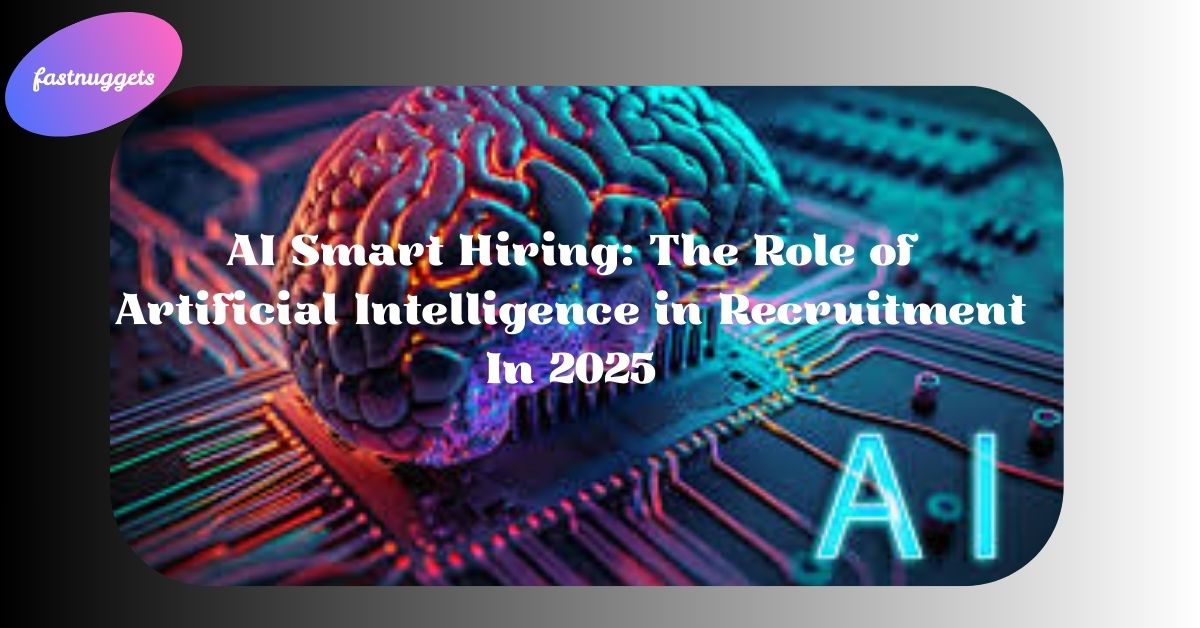Hiring the right person for the right role has always been one of the toughest challenges for any organization. As someone who has both applied for jobs and helped in the recruitment process, I’ve seen firsthand how time-consuming and stressful traditional hiring can be. But in recent years, Artificial Intelligence (AI) in recruitment has completely changed the game.
AI is no longer just a buzzword in tech, it’s a real-world solution that helps companies hire faster, reduce bias, and find the best fit for a position. In this article, I want to share how AI is transforming recruitment, why it matters for both employers and job seekers, and the potential pitfalls we need to watch out for.
How AI is Changing the Recruitment Process
In the past, recruiters would spend hours sometimes days sorting through stacks of resumes. Now, AI-powered recruitment tools can scan hundreds (or even thousands) of applications in minutes. These tools look for keywords, relevant skills, and work experience to identify the most qualified candidates.
For example, Applicant Tracking Systems (ATS) use machine learning algorithms to filter resumes based on job requirements. Instead of manually checking every application, the recruiter can focus on the top matches and save valuable time.
From my perspective, this is a win-win. Employers save money and speed up hiring, while candidates who meet the criteria have a better chance of being noticed.
AI in Candidate Matching
AI doesn’t just read resumes it learns from past hiring decisions. Over time, it can predict which applicants are more likely to succeed in a role based on previous employee performance data.
Some platforms even integrate with LinkedIn or job boards to actively suggest candidates who are not only qualified but also likely to be open to new opportunities. This makes the recruitment process more proactive rather than reactive.
AI-Powered Video Interviews
Another fascinating development is AI-powered video interviewing. In these interviews, AI analyzes a candidate’s speech patterns, tone of voice, and even facial expressions to assess confidence, communication skills, and emotional intelligence.
While some people find this technology a bit intimidating, I see its value especially for companies with large applicant pools. However, I also believe this should support human judgment, not replace it entirely.
Reducing Bias in Recruitment
One of the biggest selling points of AI in hiring is its potential to reduce unconscious bias. In theory, AI can ignore factors like gender, age, or ethnicity and focus solely on skills and qualifications.
I’ve seen recruiters use AI to anonymize resumes so the hiring decision is based purely on experience and ability. This can create a fairer process and help companies build more diverse teams.
However, I must add a caution here, if AI is trained on biased historical data, it can accidentally repeat those same biases. This is why ongoing monitoring and ethical AI practices are so important.
AI in Job Descriptions and Candidate Outreach
AI doesn’t just help companies evaluate applicants, it also helps attract them. Many organizations now use AI to write inclusive job descriptions that appeal to a broader audience.
For instance, AI can flag words that might unintentionally discourage certain groups from applying. It can also optimize job postings for search engines so they reach the right candidates faster.
When it comes to outreach, AI chatbots can engage potential applicants instantly, answer questions about the role, and guide them through the application process.
How AI Helps Me as a Job Seeker
From my personal experience, AI tools can actually help me as a candidate too. Job platforms often recommend openings that match my skills, saving me hours of scrolling through irrelevant postings. Some even analyze my resume and suggest improvements to help me get past the dreaded ATS filter.
I’ve also had AI interview practice tools simulate real interview questions and give me feedback on my answers a huge confidence boost before the actual interview.
The Risks and Limitations of AI in Recruitment
While I’m a big fan of AI in recruitment, I’m also aware it’s not perfect. Here are a few challenges I think we need to keep in mind:
- Bias in algorithms – AI is only as fair as the data it’s trained on.
- Over-reliance on automation – Human intuition and cultural fit are still essential.
- Privacy concerns – AI needs access to sensitive personal data, which must be protected.
- Candidate anxiety – Some applicants might feel uncomfortable being evaluated by a machine.
This is why I believe AI should support, not replace, human recruiters. The best hiring decisions happen when technology and human judgment work together.
The Future of AI in Recruitment
Looking ahead, I think AI will become even more personalized. Instead of just matching skills to job descriptions, it will analyze personality traits, work styles, and even team dynamics to find the perfect cultural fit.
I also expect AI to play a bigger role in onboarding helping new hires adapt faster by recommending training programs and resources tailored to their needs.
Conclusion
For me, the real power of AI in recruitment lies in its ability to make the hiring process faster, fairer, and more efficient. As both a job seeker and someone who has worked with hiring teams, I can confidently say that when used ethically, AI in recruitment benefits everyone involved.
It’s not about replacing human recruiters it’s about giving them smarter tools so they can focus on what truly matters: finding the right people and helping them thrive.
